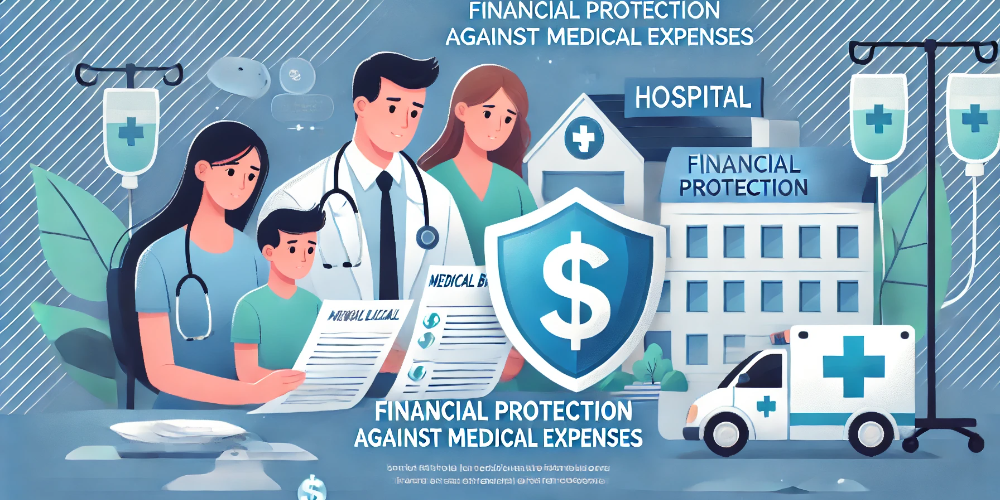Why is health insurance important? A Complete Guide to Securing Your Family’s Future

Introduction
Having health insurance is crucial for both wellbeing and financial stability. By covering medical costs, it guarantees that people and families may obtain the healthcare they require without experiencing financial difficulty. Having a health insurance policy is now a need rather than a luxury due to the rising expenses of healthcare, its unpredictable benefits, and the vital role it plays in protecting one’s health and financial stability in the face of health problems. This article highlights the significance of health insurance.
Why is health insurance important?
Having a health insurance policy is essential for the following reasons:
1. Financial Protection Against Medical Expenses
One of the primary reasons health insurance is important is its ability to protect against exorbitant medical costs. Hospitalization, surgeries, medications, and diagnostic tests can be expensive, and without insurance, these costs can drain savings. A comprehensive health insurance plan covers a significant portion of these expenses, reducing the financial burden on policyholders.
Example:
Consider an individual diagnosed with a chronic illness like diabetes. The cost of regular doctor visits, medications, and lab tests can accumulate over time. A health insurance policy helps cover these recurring expenses, making treatment more affordable.

2. Access to Quality Healthcare Services
Health insurance ensures access to a network of hospitals, clinics, and healthcare providers. Many policies offer cashless hospitalization, where the insurer directly settles the bills with the hospital, eliminating the need for upfront payments. This enables insured individuals to receive timely and quality medical care.
Example:
A person suffering from a heart attack requires immediate medical attention. Without health insurance, they may hesitate to seek emergency care due to cost concerns. With an insurance policy, they can access treatment without delay, potentially saving their life.
3. Preventive Care and Wellness Benefits
Many health insurance plans include preventive care services such as vaccinations, annual check-ups, and screenings. Early detection of illnesses can lead to better treatment outcomes and lower healthcare costs in the long run.
Example:
A policyholder undergoes an annual health check-up covered by their insurance. During the screening, doctors detect high blood pressure early, allowing them to take preventive measures and avoid severe health complications.
4. Mental Health Coverage
Mental health is an integral part of overall well-being, and many health insurance plans now cover mental health treatments, including therapy and counseling. This ensures individuals receive the necessary support to manage stress, anxiety, depression, and other mental health conditions.
Example:
An employee experiencing work-related stress and anxiety can access professional counseling sessions covered by their health insurance, improving their mental health and productivity.
5. Protection Against Lifestyle Diseases
Modern lifestyles have led to an increase in diseases such as hypertension, diabetes, and obesity. Health insurance provides coverage for the treatment of such lifestyle-related ailments, making it easier for individuals to manage their conditions without financial strain.
Example:
A middle-aged individual diagnosed with high cholesterol benefits from insurance coverage for medications, doctor consultations, and dietitian visits, helping them manage their condition effectively.
6. Tax Benefits
Health insurance premiums are eligible for tax deductions under various tax laws, depending on the country. This provides an added financial incentive for individuals to invest in health insurance policies.
Example:
In India, individuals can claim tax deductions under Section 80D of the Income Tax Act for premiums paid towards health insurance for themselves, their spouse, children, and parents.
7. Security for Family Members
Family health insurance plans cover multiple members under a single policy, ensuring the well-being of loved ones. This is particularly beneficial for aging parents and young children who require frequent medical attention.
Example:
A young professional purchases a family floater plan that covers their parents. When the father requires surgery, the insurance plan covers the expenses, relieving the family of a significant financial burden.
How to Use Health Insurance Effectively?
To get the maximum benefits from your health insurance, follow these steps:
- Choose the Right Policy – Select a policy that meets your needs, covers critical illnesses, and has an extensive hospital network.
- Know Your Coverage – Read the policy details carefully, including hospitalization coverage, pre-existing conditions, and exclusions.
- Use Cashless Hospitals – Opt for treatment at network hospitals to avoid upfront payments.
- Claim Process Awareness – Understand the process of filing a claim, whether it is cashless or reimbursement-based.
- Renew on Time – Keep your policy active by renewing it before expiry to avoid losing benefits.
- Keep Necessary Documents – Always have copies of insurance cards, policy details, and hospital bills for easy claim processing.
Top 5 Advantages of Health Insurance
- Protects Savings – Covers medical expenses, ensuring that you don’t deplete your savings.
- Covers Pre- and Post-Hospitalization Expenses – Includes doctor consultations, diagnostic tests, and post-treatment recovery.
- Secures Your Family – Family floater plans cover all members, ensuring complete protection.
- Covers Critical Illnesses – Some policies provide special coverage for life-threatening diseases like cancer and heart ailments.
- Additional Benefits – Includes coverage for ambulance charges, daycare procedures, and annual health check-ups.
Top 5 Disadvantages of Health Insurance
- Waiting Periods: Some policies have waiting periods before they cover pre-existing diseases.
- Exclusions: Not all treatments and diseases are covered, such as cosmetic surgeries or alternative treatments.
- Premium Costs: Good coverage comes at a high premium, which may be unaffordable for some.
- Claim Rejections: IncorSub-Limits & Co-Payments Sorect documentation or policy violations can lead to claim denials.
- My policies have limits on room rent, specific treatments, or require co-payment, reducing the claim amount.
Conclusion
A vital tool for preserving both financial security and health is health insurance. In addition to financial stability, it offers family members access to high-quality healthcare, preventive care, mental health support, coverage for lifestyle diseases, tax advantages, and security. In a time when health care costs are on the rise, purchasing a comprehensive health insurance policy is a smart move that will guarantee future health and peace of mind. Now is the moment to prioritize health insurance in order to avoid financial hardship and guarantee prompt access to necessary medical care.
